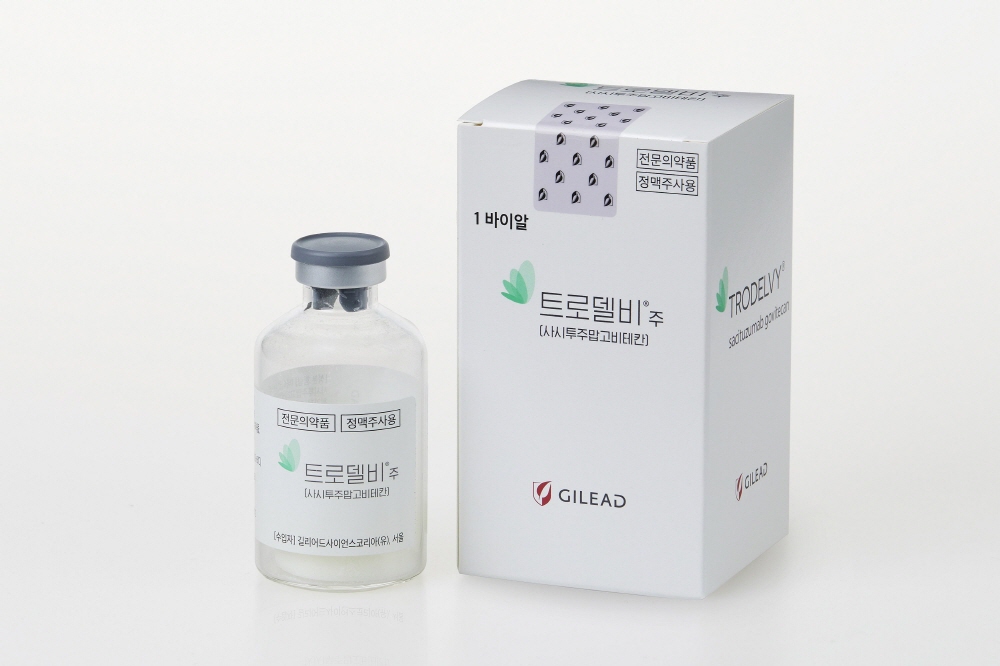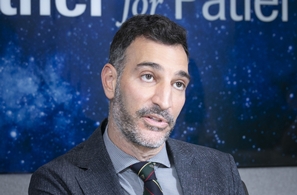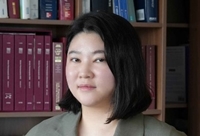- Difficulty expanding indications for antibody-drug conjugate
- by Moon, sung-ho | translator Alice Kang | Oct 30, 2024 05:54am
Although the companies aimed to expand the scope of coverage of their drugs based on their effectiveness in specific cancer types, the expectations damped somewhat due to the disappointing clinical research results.
Nevertheless, the domestic and international pharmaceutical and bio industries are attempting to develop new drugs by starting clinical research on the combined use of ADCs and immuno-oncology drugs.

The leading products in the market include TRODELVY® (sacituzumab govitecan-hziy, Gilead), and datopotamab deruxtecan (AstraZeneca, Daiichi Sankyo). However, these candidates have recently struggled to expand their indications.
According to industry sources on the 25th, Gilead recently formalized the ‘abandonment’ of its application to expand Trodelvy’s indication to urothelial cancer in consultation with the US Food and Drug Administration (FDA).
Troldelvy binds to the Trop-2 protein, which is highly expressed in a variety of cancers including breast cancer, and releases the drug inside the tumor cells, destroying not only the tumor cells but also the tumor microenvironment, with minimal impact on healthy cells.
Currently, it has demonstrated efficacy in advanced triple-negative breast cancer (TNBC) and HR+/HER- breast cancer.
However, the company abandoned its other promising indication - urothelial carcinoma. The company failed to demonstrate overall survival (OS) in the TROPiCS-04 study, a Phase III confirmatory trial that was part of the conditional approval.
The Keytruda (pembrolizumab, MSD) and Padcev (enfortumab vedotin, Astellas) combination therapy, which has been introduced in Korea as a first-line treatment option for urothelial carcinoma, stood out in the trial, demonstrating its relative effect.
Another TROP-2 class ADC, datopotamab deruxtecan, Dato-DXd, is also facing difficulties. The final OS analysis HR+/HER2 low- or negative-expressing breast cancer did not show a statistically significant improvement over chemotherapy.
At the same time, it failed to achieve statistical significance in OS compared to docetaxel in advanced/metastatic NSCLC. Following the failure of Trodelvy in demonstrating survival benefits in metastatic stage IV NSCLC, datopotamab deruxtecan is also struggling to gain traction in the lung cancer space.
However, AstraZeneca and Daiichi Sankyo have applied to the FDA for the approval of datopotamab deruxtecan for advanced/metastatic non-squamous NSCLC, as they believe it could be a new treatment option.
As such, the FDA is expected to make a decision on whether to approve datopotamab deruxtecan for NSCLC by December 20th.
Dr. Min-Hee Hong, professor of Medical Oncology at Severance Hospital, said, “If you think about the role of ADCs in NSCLC, nothing has been approved so far. “However, if you look at Trop-2-targeted ADC studies, there is some talk that some subgroup analysis results were good. But whether the company can get FDA approval with the data remains in question, as it didn't meet its primary endpoint.”
“I think it shows what we call “cherry picking” in the medical community, where they're really cherry-picking the data that they want to show, so I think it's fair to say that there's no approved drug and no role for the drug at this point. But we'll have to wait and see because the FDA’s decision hasn't been announced yet.”
While global pharmaceutical companies' next-generation ADC candidates are struggling to expand their scope, the domestic pharmaceutical and biotech industry's presence in ADC development has been growing.
The Korean pharmaceutical and biotechnology industries are attempting various clinical trials with the combination of ADCs and immuno-oncology drugs, which are being actively conducted around the world and are leading to actual technology export results. Gilead, AstraZeneca, and Daiichi Sankyo are already attempting clinical studies with immuno-oncology drugs such as Keytruda or Imfinzi (durvalumab) in combination with Trodelvy and datopotamab deruxtecan.
One representative domestic company is LigaChem Biosciences. LigaChem Biosciences is a company specializing in ADC development that has signed a total of 10 technology transfer agreements.
Starting with the technology transfer to China's Fosun Pharma in 2015, the company successfully exported its LCB84 technology to Janssen in December last year. LCB84 is an ADC candidate that can target various solid cancers, including triple-negative breast cancer and non-small cell lung cancer.
LigaChem Biosciences also recently announced that it has signed 2 technology transfer agreements with Japan's Ono Pharmaceutical Industries, including LCB97, which targets the L1CAM protein. The total value of the two agreements is worth over USD 700 million (KRW 943.5 billion), with the specific upfront payment amount undisclosed as per the parties' agreement.
LCB97 targets L1CAM, a protein expressed in several solid tumors, including lung, pancreatic, and colorectal cancers. In February of last year, LigaChem Biosciences entered into a research and development agreement with Elthera AG in Switzerland for the L1CAM antibody, securing worldwide rights, including for ADC use.
In addition, various domestic biotech companies such as NeoImmuneTech and TXINNO Bioscience are attempting clinical research with the concept of ADC and immuno-oncology combination therapy.
A domestic pharmaceutical and biotech industry official said, “The success of the Padcev+Keytruda combination attracted much attention to the combination of ADCs and immuno-oncology drugs. And the combination’s reimbursement is gaining great interest in Korea. Although it has no commercialized items yet, LigaChem Biosciences gained attention for signing licensing agreements with global big pharma companies such as Ono Pharmaceutical, Janssen, and Amgen. This is because ADCs are being regarded as the next cash cow in the global market.”
-

- 0
댓글 운영방식은
댓글은 실명게재와 익명게재 방식이 있으며, 실명은 이름과 아이디가 노출됩니다. 익명은 필명으로 등록 가능하며, 대댓글은 익명으로 등록 가능합니다.
댓글 노출방식은
댓글 명예자문위원(팜-코니언-필기모양 아이콘)으로 위촉된 데일리팜 회원의 댓글은 ‘게시판형 보기’와 ’펼쳐보기형’ 리스트에서 항상 최상단에 노출됩니다. 새로운 댓글을 올리는 일반회원은 ‘게시판형’과 ‘펼쳐보기형’ 모두 팜코니언 회원이 쓴 댓글의 하단에 실시간 노출됩니다.
댓글의 삭제 기준은
다음의 경우 사전 통보없이 삭제하고 아이디 이용정지 또는 영구 가입제한이 될 수도 있습니다.
-
저작권·인격권 등 타인의 권리를 침해하는 경우
상용 프로그램의 등록과 게재, 배포를 안내하는 게시물
타인 또는 제3자의 저작권 및 기타 권리를 침해한 내용을 담은 게시물
-
근거 없는 비방·명예를 훼손하는 게시물
특정 이용자 및 개인에 대한 인신 공격적인 내용의 글 및 직접적인 욕설이 사용된 경우
특정 지역 및 종교간의 감정대립을 조장하는 내용
사실 확인이 안된 소문을 유포 시키는 경우
욕설과 비어, 속어를 담은 내용
정당법 및 공직선거법, 관계 법령에 저촉되는 경우(선관위 요청 시 즉시 삭제)
특정 지역이나 단체를 비하하는 경우
특정인의 명예를 훼손하여 해당인이 삭제를 요청하는 경우
특정인의 개인정보(주민등록번호, 전화, 상세주소 등)를 무단으로 게시하는 경우
타인의 ID 혹은 닉네임을 도용하는 경우
-
게시판 특성상 제한되는 내용
서비스 주제와 맞지 않는 내용의 글을 게재한 경우
동일 내용의 연속 게재 및 여러 기사에 중복 게재한 경우
부분적으로 변경하여 반복 게재하는 경우도 포함
제목과 관련 없는 내용의 게시물, 제목과 본문이 무관한 경우
돈벌기 및 직·간접 상업적 목적의 내용이 포함된 게시물
게시물 읽기 유도 등을 위해 내용과 무관한 제목을 사용한 경우
-
수사기관 등의 공식적인 요청이 있는 경우
-
기타사항
각 서비스의 필요성에 따라 미리 공지한 경우
기타 법률에 저촉되는 정보 게재를 목적으로 할 경우
기타 원만한 운영을 위해 운영자가 필요하다고 판단되는 내용
-
사실 관계 확인 후 삭제
저작권자로부터 허락받지 않은 내용을 무단 게재, 복제, 배포하는 경우
타인의 초상권을 침해하거나 개인정보를 유출하는 경우
당사에 제공한 이용자의 정보가 허위인 경우 (타인의 ID, 비밀번호 도용 등)
※이상의 내용중 일부 사항에 적용될 경우 이용약관 및 관련 법률에 의해 제재를 받으실 수도 있으며, 민·형사상 처벌을 받을 수도 있습니다.
※위에 명시되지 않은 내용이더라도 불법적인 내용으로 판단되거나 데일리팜 서비스에 바람직하지 않다고 판단되는 경우는 선 조치 이후 본 관리 기준을 수정 공시하겠습니다.
※기타 문의 사항은 데일리팜 운영자에게 연락주십시오. 메일 주소는 dailypharm@dailypharm.com입니다.
- [Op-Ed] Patients, no time left for 'new drug comb therapies'
- Special Contribution | Eo, Yun-Ho









